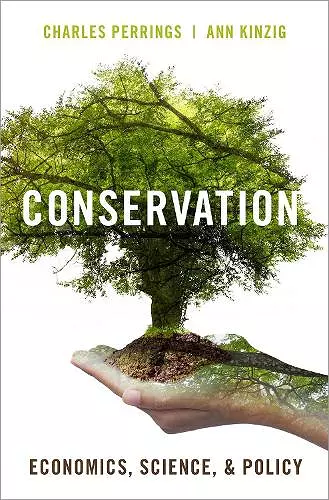Conservation
Economics, Science, and Policy
Charles Perrings author Ann Kinzig author
Format:Paperback
Publisher:Oxford University Press Inc
Published:12th Oct '21
Currently unavailable, and unfortunately no date known when it will be back

A unified theory of conservation that addresses the broad problem of conservation, the principles that inform conservation choices, and the application of those principles to the management of the natural world. The conservation of natural resources, like that of any other asset, involves trade-offs. Yet, in a world faced with the harsh realities of climate change, crafting the right environmental policies is an increasingly urgent task. In Conservation, Charles Perrings and Ann Kinzig bring together new research in economics and biodiversity to investigate conservation decisions and the theory behind them. Perrings and Kinzig apply the concept of conservation broadly to examine how the principles of conservation apply to the management of the natural world. They demonstrate that the same basic principles serve as the foundation of all rational conservation decisions, from managing financial assets to safeguarding at-risk ecosystems. Whether someone is deciding to hold or dispose of a stock or whether to exploit or preserve a natural resource, they are better off choosing to conserve a resource when its value to them, if conserved, is greater than its value when converted. The book also considers the context of such conservation decisions. Just as national tax rules influence choices about financial investments, environmental regulations within countries, and environmental agreements between countries, impact the decisions regarding natural resources. Building on their basic theory of conservation, Perrings and Kinzig address key issues in the field of environmental economics, including the valuation of ecosystem services and environmental assets; the limits on the substitutability of produced and natural capital; and the challenges posed by the often weak markets for ecosystem services oriented toward the public good. They also address the problem of scale: while decisions might be easier to make at the local level, many conservation policies need to apply at either the national or international level to succeed. Written by experts from both social and hard sciences, this book presents a unified theory of conservation and provides a model for a more effective way to approach the vitally important issue.
This is a remarkably learned, informative, and useful book that will work well in graduate courses. Highly recommended. Upper-division undergraduates. Graduate students, faculty, and professionals. * R. M. Whaples, Wake Forest University, CHOICE *
ISBN: 9780190613617
Dimensions: 150mm x 231mm x 25mm
Weight: 748g
448 pages